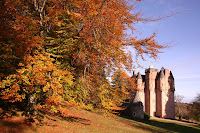 These last few days have seemed like autumn here in Virginia. We’ve had brisk, sunny days and cool nights. Leaves are falling, even though the trees are still stubbornly green.
These last few days have seemed like autumn here in Virginia. We’ve had brisk, sunny days and cool nights. Leaves are falling, even though the trees are still stubbornly green.
On 19 September 1819, John Keats took an evening walk along the River Itchen near Winchester and was inspired to write one of the most perfect poems in the English language:
Season of mists and mellow fruitfulness,
Close bosom-friend of the maturing sun;
Conspiring with him how to load and bless
With fruit the vines that round the thatch-eves run;
To bend with apples the moss’d cottage-trees,
And fill all fruit with ripeness to the core;
To swell the gourd, and plump the hazel shells
With a sweet kernel; to set budding more,
And still more, later flowers for the bees,
Until they think warm days will never cease,
For summer has o’er-brimm’d their clammy cells.
Who hath not seen thee oft amid thy store?
Sometimes whoever seeks abroad may find
Thee sitting careless on a granary floor,
Thy hair soft-lifted by the winnowing wind;
Or on a half-reap’d furrow sound asleep,
Drowsed with the fume of poppies, while thy hook
Spares the next swath and all its twined flowers:
And sometimes like a gleaner thou dost keep
Steady thy laden head across a brook;
Or by a cider-press, with patient look,
Thou watchest the last oozings, hours by hours.
Where are the songs of Spring? Ay, where are they?
Think not of them, thou hast thy music too,–
While barred clouds bloom the soft-dying day,
And touch the stubble-plains with rosy hue;
Then in a wailful choir the small gnats mourn
Among the river sallows, borne aloft
Or sinking as the light wind lives or dies;
And full-grown lambs loud bleat from hilly bourn;
Hedge-crickets sing; and now with treble soft
The redbreast whistles from a garden-croft,
And gathering swallows twitter in the skies.

Here’s the poem read by Ben Whishaw, the actor who played Keats in the movie, Bright Star:
 I think the imagery in To Autumn is just beautiful, giving the mood of autumn as well as the sights and sounds.
I think the imagery in To Autumn is just beautiful, giving the mood of autumn as well as the sights and sounds.
The poem was included in volume of Keats’ works printed in 1820 to better reviews than his earlier works. A year later, Keats died.
You could say he wrote the poem in the autumn of his young life.
Last Friday Megan asked about fall vegetables, so I’ll ask this: If you took a walk near your house, like Keats did, what would catch your eye? What’s your favorite part about being outdoors in autumn?
Check out the review of Chivalrous Captain, Rebel Mistress in the Chicago Tribune!
Don’t forget to visit the new Harlequin Historical blog on eHarlequin and Diane’s Blog on Thursday!
